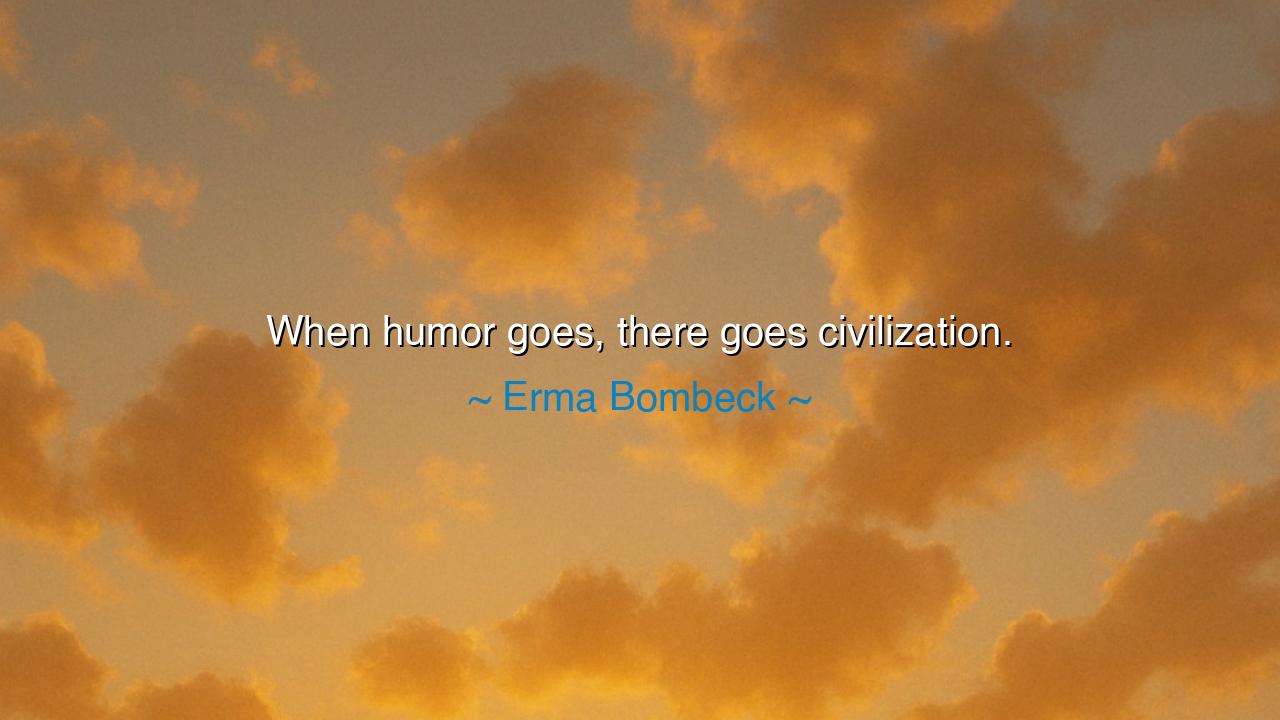
When humor goes, there goes civilization.






In the fading twilight of a weary world, where human hearts grow heavy with toil and strife, Erma Bombeck — the chronicler of everyday courage and wit — left behind a warning wrapped in wisdom: “When humor goes, there goes civilization.” These words, gentle yet thunderous, remind us that laughter is not merely a sound — it is the breath of the human spirit, the heartbeat of compassion, the bond that keeps men and women from falling into savagery. When laughter dies, cruelty rises; when joy fades, the soul of a people begins to crumble.
Bombeck, a woman who found poetry in the dust and dishes of daily life, knew that humor was no trivial thing. She lived in the midst of ordinary chaos — families, work, mistakes, and small defeats — and yet she wielded laughter as a lamp against despair. Her writing, filled with warmth and irony, revealed that humor is civilization’s most humane defense: it teaches patience, forgiveness, and humility. To laugh at one’s burdens is to keep them from becoming chains. To share that laughter is to remind others that they are not alone in their struggle.
“When humor goes, there goes civilization.” This is no jest; it is a prophecy. For laughter is the language of empathy. It binds neighbors, disarms enemies, and transforms hardship into endurance. When people cease to laugh — when they take themselves too seriously, when fear silences jest, when anger drowns out irony — they forget what it means to be human. Tyrants and fanatics fear laughter more than swords, for laughter exposes falsehood and restores equality. To mock the pompous is to topple the throne of arrogance; to laugh kindly with another is to build a bridge of peace.
History offers its witness. In the dark days of World War II, when the world groaned beneath the boots of oppression, laughter still flickered like a candle in the night. Soldiers told jokes in trenches, and prisoners in camps whispered humor as rebellion. The Danish pianist Victor Borge himself — who fled the Nazi invasion — used comedy and music to comfort the wounded spirit of his people. In laughter, even amid terror, civilization endured. For as long as humans can laugh, they remain unbroken; they remain themselves.
When humor goes, the world hardens. The smile fades into suspicion, jest turns to judgment, and dialogue to shouting. Without humor, the soul loses its elasticity — it forgets how to bend without breaking. The ancients knew this well. The philosopher Aristotle wrote of wit as a virtue, a balance between vulgarity and dullness, necessary for friendship and discourse. The Romans, too, used satire to speak truth to power. And even in sacred scriptures, there are glimpses of divine humor — for a Creator who gives humanity free will must laugh gently at our follies, or else despair.
To lose humor is to lose perspective, and with perspective, we lose mercy. For laughter teaches us to look upon our flaws with grace. It humbles kings and comforts servants; it turns tragedy into teaching. Civilization is not built of marble or iron — it is built of shared understanding, and that understanding is born of humor. A nation that forgets how to laugh at itself will soon forget how to forgive itself.
So let this teaching be carved into the hearts of those who listen: Protect your humor as you would protect your soul. Do not let bitterness or pride rob you of laughter. When life grows cruel, find something absurd and smile; when times are dark, tell a story that brings light. Laugh with others, not at them, and keep your laughter kind, for cruelty in jest is poison to the spirit. Remember always: humor is the breath of civilization. Guard it, nurture it, and share it — for when it fades, humanity fades with it.






AAdministratorAdministrator
Welcome, honored guests. Please leave a comment, we will respond soon